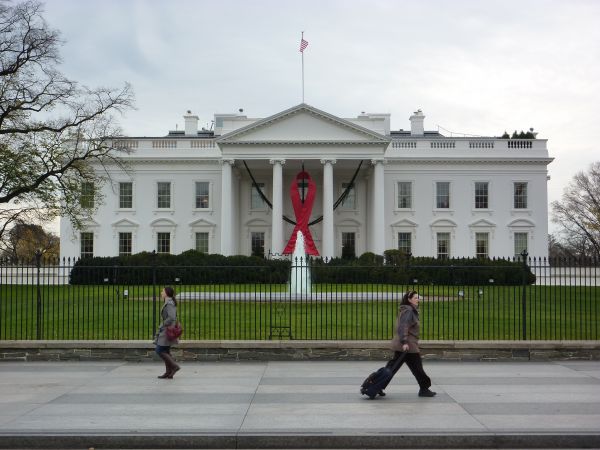World AIDS Day 2009 is a date that many U.S. activists in the fight against the spread of HIV/AIDS thought would be a high water mark in their decades-long struggle against the deadly disease. President George W. Bush had dramatically increased U.S. AIDS funding during his term in office — albeit with caveats activists say hurt some of their efforts — and President Obama had promised to do even more on the campaign trail.
But as activists nationwide take time today a day to focus on a disease that’s killed more than half a million Americans, some of them say the promises of a renewed focus on AIDS that came with Obama haven’t been realized.
“It’s heartbreaking,” Matthew Kavanagh, director of U.S. advocacy for Health GAP told TPMDC. His group was among four U.S. AIDS groups that gave Obama a “D+” on AIDS policy yesterday. Kavanagh said that to his shock, he felt Bush had a better record on AIDS research than Obama. “I could not imagine I would be saying that now [last year]. Many folks in the global AIDS movement were so looking forward to stepping up the fight with Obama.”
Dr. Paul Zeitz, executive director of the Global AIDS Alliance, said he would have given Bush a B+ this time last year. The shift since Obama has been “shocking” to the activists around the world, he said.
“It’s outrageous,” Zeitz told TPMDC from a protest his group and others held near the White House today. He said activists around the world are “dismayed” by what they’ve seen from Obama’s commitment to AIDS in his first year.
There are two main complaints with Obama’s AIDS policy from activists. First, funding. Bush raised AIDS funding to its highest level while in office, and budget requests sent by Obama to Congress for next year call for funding to essentially remain at the Bush administration levels.
The groups that issued the “report card” yesterday claim that’s not enough. According to the report it issued, “flat-lining” the AIDS budget line is effectively reducing the U.S. commitment to fighting AIDS because “it will not even keep pace with global medical inflation, estimated at 4-10% this year.”
“Their excuse is the economy — that there’s no money to increase AIDS funding right now,” Zeitz said of the Obama administration. He was an invited guest to yesterday’s World AIDS Day program hosted by the administration and said he’s spoken with a number of officials about his concerns over the budget. “You know, we’ve heard excuses and excuses time and time again,” Zeitz said of the discussions. “And the world is watching them break their commitment.”
The second move angering AIDS activists is Obama’s decision to back off a campaign promise to end the ban on needle exchange programs in government-funded aid programs. As Time reported earlier this year, the promise took a backseat to political concerns as Obama and the Democrats worried they’d be painted as soft on drugs if they supported it.
“Many of us worked hard to get him elected, based on the things he said” about needle exchanges and other AIDS programs, Kavanagh said. “Now we don’t see it happening.”
Administration officials point to Obama’s lifting of the nation’s entry ban for AIDS patients as well as ongoing efforts to pay for research and treatment as evidence that Obama is fully committed to expanding the U.S.’ role in the global AIDS fight.
“It is clear that our nation’s investments in HIV/AIDS are having an impact,” Secretary of State Hillary Clinton told reporters yesterday. “President Obama and I are dedicated to enhancing America’s leadership in the fight against global AIDS.”
The end of the travel ban, which started with action by Congress that began under the Clinton Administration and had the support of Bush, led organizers of the annual International AIDS Conference to schedule the first American meeting for Washington, D.C. in 2012. At the event attended by Secretary Clinton yesterday, Obama’s AIDS adviser, Amb. Eric Goosby, hailed the announcement of the 2012 conference as evidence that the administration is advancing the fight against AIDS and HIV.
“We are just getting started,” Goosby said in a speech at the event, “but President Obama has demonstrated solid leadership on domestic and global HIV/AIDS issues, and it is an exciting time to be a part of his team.”
Kavanagh said Obama is still talking the talk on AIDS and he said he has hope that Obama will live up to the promises Kavanagh said he made to AIDS activists.
“He’s done some positive stuff,” Kavanagh said. “And all the things he’s doing rhetorically are spot on.”
“It’s just unclear to me why he hasn’t come through on actually doing it so far,” he said.
Late Update: White House spokesperson Shin Inouye responded to our story. On funding, he pointed to what he called “unprecedented steps” taken by Obama to use the stimulus to “shore up financing” for states hit by the economic downturn.
“However, [AIDS funding] is a shared responsibility between the federal and state governments,” he said. “And the federal government cannot be expected to fill in for all of the gaps in services resulting from state budget cuts.”
Inouye had this to say about needle exchange programs: “[Obama] has said that he supports lifting the ban on federal funding for needle exchange when it is part of comprehensive, evidence-based programs. We are committed to getting this done as part of the National HIV/AIDS Strategy.”









